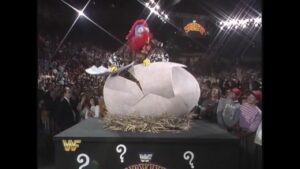November 17, 2021 marks the 25th anniversary of the formation of World Wrestling Entertainment stable Nation of Domination. Formed in 1996, the stable’s theme and iconography drew from allusions to real life organizations like the Black Panthers and the Nation of Islam that promoted civil rights and self sufficiency for African Americans. An interest in these causes and organizations found a second wave in the 1990s, in the wake of social divides and racial tensions caused by the beating of Los Angeles man Rodney King by LAPD officers and the ensuing L.A. Riots, and football star O.J. Simpson’s trial for the alleged murder of his wife. In 1996, the Nation of Islam sponsored perhaps Generation X’s most ambitious African American civil rights demonstration, the Million Man March in Washington D.C. With these images in the public consciousness, love it or hate it the idea of “black power” was no longer a relic of the 1960s and 70s but a hot button issue of the 1990s.
WWE was entering its “Attitude Era”, in which hot button issues were fair game to mine for edgier content. The Nation stable formed around wrestler Ron Simmons. A former football player, Simmons became the first African American man to win the WCW Championship, making him only the second African American man overall to win any pro wrestling heavyweight championship title. Upon entering the WWE, he took on the gimmick of a gladiator named Farooq Asad, and feuded with WWE’s first African American Intercontinental Champion, Ahmed Johnson.
Throughout the feud with Ahmed Johnson is when the shift in Simmons’s gimmick began to emerge. He dropped the gladiator trappings, and manager Sunny, and took on the role of a dictatorial black nationalist leader. His newly assembled team took the name Nation of Domination, which had previously been used by two of its founding members, J.C. Ice and Wolfie D, in other promotions. The lineup of the Nation changed frequently in the beginning, with even former nemesis Ahmed Johnson joining for a time. However, the lineup that came to define the stable, that emerged when Simmons/Farooq promised a “bigger, better, badder, blacker” Nation included Kama Mustafa (in future to be called The Godfather), D’Lo Brown, strongman Mark Henry, and an up and coming third generation wrestler called Dwayne Johnson, rebranding himself as The Rock after his shiny happy babyface run as “Rocky Maivia” was dead on arrival.
The Nation, wearing all black like the Black Panther party of the 1970s and Afrocentric regalia, evoked a double edged sword of images: dominance, menace, pride, separatism, revolution. They were an attempt to start a dialogue about the country’s very real and present racial tensions, such as in a controversial angle in which D-Generation X accused The Hart Foundation of spray-painting abhorrent racial slurs in the Nation’s locker room. Something of a dialogue between the three factions, about race and racism in the United States, ensued. While clunky by today’s standards, with the Nation of Domination WWE at least dared to try and touch a raw nerve.
As Johnson grew into his persona as “The Rock”, he assumed leadership of the Nation, and as his feud with “Stone Cold” Steve Austin intensified, he eventually broke out on a second solo run. His arrogant and rowdy new persona caught the zeitgeist, his catchphrases became fin de siècle in early 2000s pop culture, and his outsized charisma launched him into becoming one of Hollywood’s most successful movie stars of all time.
Echoes of Nation of Domination can still be seen and felt in the landscape of WWE today. The RETRIBUTION stable of 2020, like the Nation, traded on the iconography of social unrest ripped from the headlines at the anarchic beginning of their run. Numerous in number, dressed in concealing black hooded sweatshirts and wreaking havoc behind the scenes at the WWE Performance center during its first crowdless tapings, RETRIBUTION echoed the appearance of the protesters that crowded the streets of the United States’ major cities in the wake of the murder of George Floyd. Apollo Crews’ 2020 heel gimmick, that of an authoritative Nigerian king, owes much to the template set by Simmons with his Farooq character. Although their gimmicks couldn’t be more different, the Nation set the stage for later successful team The New Day by presenting a group of unapologetically black, allied characters whose members were a true threat in the ring. The later successes of Johnson also set a new template for mainstream success for pro wrestlers, one taken up gladly by later talent like John Cena.
The pop culture of the 1990s hung in a delicate, sometimes uneven balance between social commentary and shock value. The Nation of Domination angle was no different, drawing on politically charged symbolism to evoke both empowerment, to some, and fear, to others, playing into pre-existing stereotypes about African American civil rights while also drawing on them to create a stable of talented performers.
More From LWOS Pro Wrestling
Stay tuned to the Last Word on Pro Wrestling for more on this and other stories from around the world of wrestling, as they develop. You can always count on LWOPW to be on top of the major news in the wrestling world, as well as to provide you with analysis, previews, videos, interviews, and editorials on the wrestling world. You can check out an almost unlimited array of WWE content on the WWE Network and Peacock.






